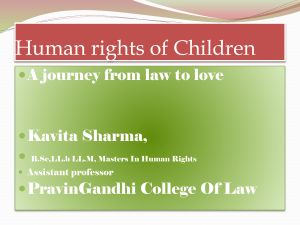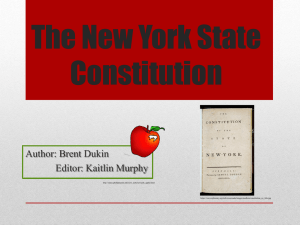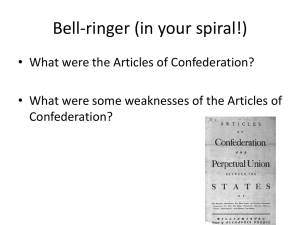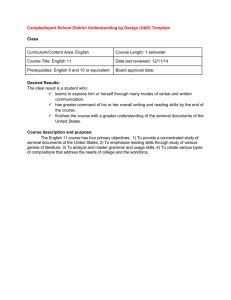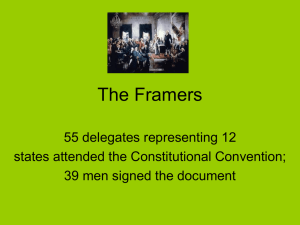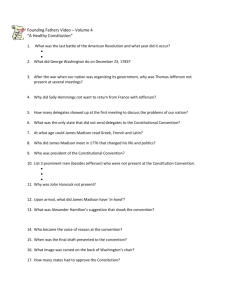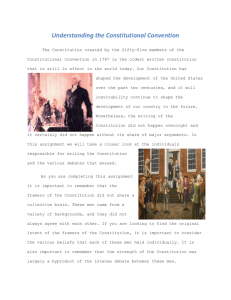Freedom of speech
advertisement
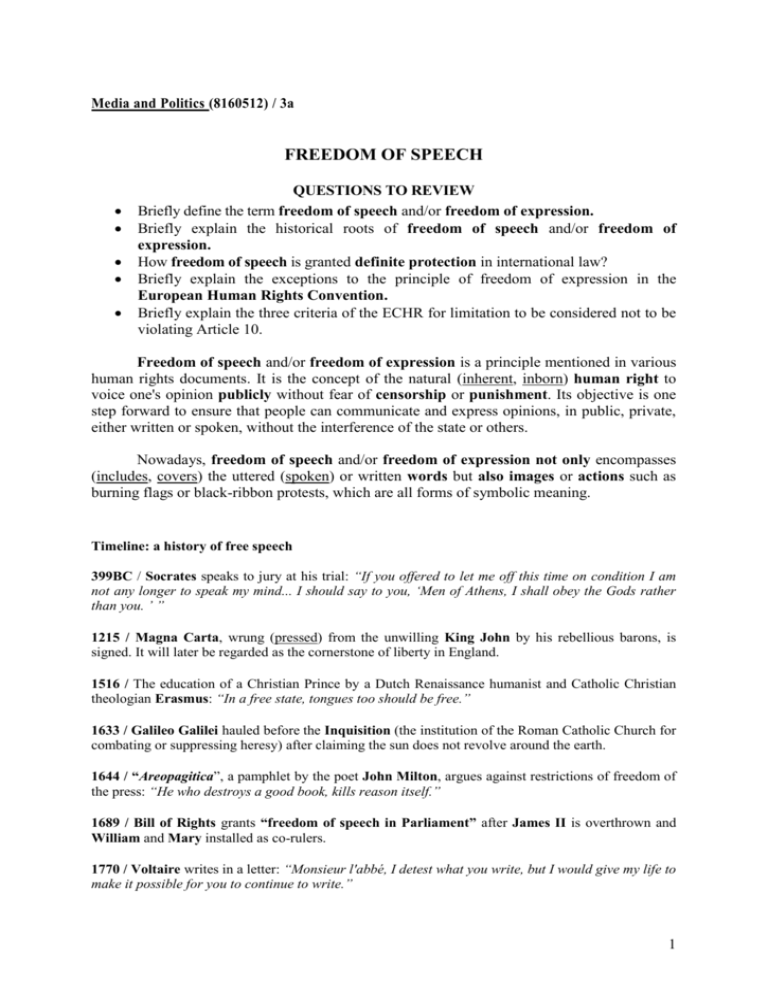
Media and Politics (8160512) / 3a FREEDOM OF SPEECH QUESTIONS TO REVIEW Briefly define the term freedom of speech and/or freedom of expression. Briefly explain the historical roots of freedom of speech and/or freedom of expression. How freedom of speech is granted definite protection in international law? Briefly explain the exceptions to the principle of freedom of expression in the European Human Rights Convention. Briefly explain the three criteria of the ECHR for limitation to be considered not to be violating Article 10. Freedom of speech and/or freedom of expression is a principle mentioned in various human rights documents. It is the concept of the natural (inherent, inborn) human right to voice one's opinion publicly without fear of censorship or punishment. Its objective is one step forward to ensure that people can communicate and express opinions, in public, private, either written or spoken, without the interference of the state or others. Nowadays, freedom of speech and/or freedom of expression not only encompasses (includes, covers) the uttered (spoken) or written words but also images or actions such as burning flags or black-ribbon protests, which are all forms of symbolic meaning. Timeline: a history of free speech 399BC / Socrates speaks to jury at his trial: “If you offered to let me off this time on condition I am not any longer to speak my mind... I should say to you, ‘Men of Athens, I shall obey the Gods rather than you. ’ ” 1215 / Magna Carta, wrung (pressed) from the unwilling King John by his rebellious barons, is signed. It will later be regarded as the cornerstone of liberty in England. 1516 / The education of a Christian Prince by a Dutch Renaissance humanist and Catholic Christian theologian Erasmus: “In a free state, tongues too should be free.” 1633 / Galileo Galilei hauled before the Inquisition (the institution of the Roman Catholic Church for combating or suppressing heresy) after claiming the sun does not revolve around the earth. 1644 / “Areopagitica”, a pamphlet by the poet John Milton, argues against restrictions of freedom of the press: “He who destroys a good book, kills reason itself.” 1689 / Bill of Rights grants “freedom of speech in Parliament” after James II is overthrown and William and Mary installed as co-rulers. 1770 / Voltaire writes in a letter: “Monsieur l'abbé, I detest what you write, but I would give my life to make it possible for you to continue to write.” 1 1789 / “The Declaration of the Rights of Man”, a fundamental document of the French Revolution, provides for freedom of speech. 1791 / The First Amendment of the US Bill of Rights guarantees five freedoms: of religion, speech, the press, the right to assemble and the right to petition the government for a redress of grievances. 1859 / “On Liberty”, an essay by the philosopher John Stuart Mill, argues for toleration and individuality: “If any opinion is compelled to silence, that opinion may, for aught we can certainly know, be true. To deny this is to assume our own infallibility.” 1859 / “On the Origin of Species”, by Charles Darwin, expounds the theory of natural selection. English biologist Thomas Henry Huxley publicly defends Darwin against religious fundamentalists. 1929 / Jurist Oliver Wendell Holmes, Jr. of the US Supreme Court, outlines his belief in free speech: “The principle of free thought is not free thought for those who agree with us but freedom for the thought we hate.” 1948 / The Universal Declaration of Human Rights is adopted virtually unanimously by the UN General Assembly. It urges member nations to promote human, civil, economic and social rights, including freedom of expression and religion. 1958 / “Two Concepts of Liberty”, by Isaiah Berlin, identifies negative liberty as an absence or lack of impediments, obstacles or coercion, as distinct from positive liberty (self-mastery and the presence of conditions for freedom). 1960 / After a trial at Old Bailey, Penguin wins the right to publish D H Lawrence's sexually explicit novel, “Lady Chatterley's Lover”. 1962 / “One Day In the Life of Ivan Denisovich” by Aleksandr Solzhenitsyn describes life in a labor camp during Stalin's era. Solzhenitsyn is exiled in 1974. 1989 / Iranian leader Ayatollah Khomeini issues a fatwa against Salman Rushdie over the “blasphemous” (irreligious) content of his novel, “The Satanic Verses”. The fatwa is lifted in 1998. 1992 / In “Manufacturing Consent”, Noam Chomsky points out: “Goebbels was in favor of free speech for views he liked. So was Stalin. If you're in favor of free speech, then you're in favor of freedom of speech precisely for views you despise.” 2001 / In the wake of 9/11, the Patriot Act gives the US government new powers to investigate individuals suspected of being a threat, raising fears for civil liberties. 2002 / Nigerian journalist Isioma Daniel incenses (angers) Muslims by writing about the Prophet Mohammed and Miss World, provoking riots which leave more than 200 dead. 2004 / Dutch film maker Theo van Gogh is killed after release of his movie about violence against women in Islamic societies. 2005 / “The Serious Organized Crime and Police Act” bans protest without permit within 1km of the British Parliament. 2 Historical Roots: Bill of Rights A bill of rights is a list or summary of rights that are considered important and essential by a nation. The purpose of these bills is to protect those rights against infringement (violation) by the government. The term "bill of rights" originates from Britain, where it referred to a bill that was passed by Parliament in December 1689. 1689 Bill of Rights of Britain grants “freedom of speech in Parliament” after James II is overthrown and William and Mary installed as co-rulers. As well, 1689 Bill of Rights enumerates (lists) certain rights to which citizens and permanent residents of a constitutional monarchy were thought to be entitled in the late 17th century, asserting (emphasizing) subjects' right to petition the monarch, as well as to bear arms in defense. It also sets out - or, in the view of its drafters, restates - certain constitutional requirements of the Crown to seek the consent of the people, as represented in parliament. One of the most important steps taken in history is Declaration of the Rights of Man and the Citizen, which was declared after the 1789 French Revolution. Since then, it has been an important source of principles concerning freedom of expression with its tenth and eleventh articles: Article 10: No one should be disturbed on account of his opinions, even religious, provided their manifestation does not upset the public order established by law. Article 11: The free communication of ideas and opinions is one of the most precious of the rights of man. Every citizen may, accordingly, speak, write, and print with freedom, but shall be responsible for such abuses of this freedom as shall be defined by law. The first 10 amendments to the US Constitution, which echo the contents of the 1689 Bill of Rights and collectively known as The American Bill of Rights of 1791 was another constitutional document to cover political freedoms and rights of people. There The First Amendment to the US Constitution was an excellent attempt to guarantee freedom of expression: “Congress shall make no law respecting an establishment of religion, or prohibiting the free exercise thereof; or abridging the freedom of speech, or of the press; or the right of the people peaceably to assemble, and to petition the Government for a redress of grievances.” International Law In our day freedom of speech and/or freedom of expression is protected (enshrined, preserved) in the United Nations Universal Declaration of Human Rights and is granted formal recognition by the laws of most nations. 3 Even so the degree to which the right is supported in practice varies greatly from one nation to another. In some nations with relatively authoritarian forms of government, open (overt) government censorship is enforced, while among liberal democracies, censorship has been claimed to occur in a different form (for example as a propaganda model) and there are different approaches to issues such as hate speech, obscenity, and defamation laws. Freedom of speech and/or expression is one of the basic rights guaranteed in the United Nations Universal Declaration of Human Rights adopted in 1948 and European Convention on Human Rights, which was adopted in 1950. United Nations Universal Declaration of Human Rights The articles related to freedom of expression in the Declaration are as follows: Article 18: Everyone has the right to freedom of thought, conscience and religion; this right includes freedom to change his religion or belief, and freedom, either alone or in community with others and in public or private, to manifest his religion or belief in teaching, practice, worship and observance. Article 19: Everyone has the right to freedom of opinion and expression; this right includes freedom to hold opinions without interference and to seek, receive and impart information and ideas through any media and regardless of frontiers. Technically the Declaration is a resolution of the United Nations General Assembly rather than a treaty and so it is not legally binding on members of the UN, and, while some of its provisions (clauses, articles) are considered to form part of customary international law, there is dispute as to precisely which provisions do so. Freedom of speech and/or freedom of expression is granted definite protection in international law by the International Covenant on Civil and Political Rights (adopted and opened for signature, ratification and accession by General Assembly in 1966 and entry into force in 1976) which is binding on around 150 nations. Article 19 provides that: 1. Everyone shall have the right to hold opinions without interference. 2. Everyone shall have the right to freedom of expression; this right shall include freedom to seek, receive and impart information and ideas of all kinds, regardless of frontiers, either orally, in writing or in print, in the form of art, or through any other media of his choice. 3. The exercise of the rights provided for in paragraph 2 of this article carries with it special duties and responsibilities. It may therefore be subject to certain restrictions, but these shall only be such as are provided by law and are necessary: (a) For respect of the rights or reputations of others; (b) For the protection of national security or of public order (ordre public), or of public health or morals. The right is further qualified by Article 20 which prohibits war propaganda, incitement to violence and certain forms of hate speech. A number of state parties also have official reservations to Article 20. 4 European Convention of Human Rights The European Convention on Human Rights, signed on 4 November 1950, guarantees a broad range of human rights to inhabitants (residents) of member countries of the Council of Europe, which includes almost all European nations. These rights include Article 10, which entitles (give the right) all citizens to free expression. Echoing the language of the Universal Declaration of Human Rights, Article 10 of the Convention, in its first paragraph guaranties freedom of expression: Article 10.1: “Everyone has the right to freedom of expression. This right shall include freedom to hold opinions and to receive and impart information and ideas without interference by public authority and regardless of frontiers. This article shall not prevent States from requiring the licensing of broadcasting, television or cinema enterprises.” The European Human Rights Convention permits six exceptions to the principle of freedom of expression: 1. 2. 3. 4. 5. 6. To protect national security, To protect territorial integrity, To protect public safety, Prevention of disorder or crime, Protection of health and morals, the rights and reputations of others, and Protection of the judicial process. These restrictions are shown in the second paragraph of the Article 10: Article 10.2: “The exercise of these freedoms, since it carries with it duties and responsibilities, may be subject to such formalities, conditions, restrictions or penalties as are prescribed by law and are necessary in a democratic society, in the interests of national security, territorial integrity or public safety, for the prevention disorder or crime, for the protection health or morals, for the protection of the reputation or rights of others, for preventing the disclosure of information received in confidence, or for maintaining the authority and impartiality of the judiciary.” As it is stipulated in the second part of article 10 of the ECHR, there is no absolute freedom in a democratic society. Freedom of expression is not exempt from limitations. Certain limitations to freedom of expression are necessary in democratic societies. However, , it is a matter of the democratic culture of a nation to interpret them in a non-discriminatory (just, unbiased, fair-minded) way and not to abuse (mistreat, exploit) them. There is a limit for the limits as well. These limitations are subject to strict control mechanisms. The guardian of the freedom of speech and/or freedom of expression envisaged (set forth) in the European Convention is the European Court of Human Rights. When the European Court of Human Rights was re-established in 1998, the first verdict was on a case concerning freedom of expression, which is an indicator of the importance attached to the issue. In time this court has heard many cases relating to freedom 5 of speech, including cases that have tested the professional obligations of confidentiality of journalists and lawyers, and the application of defamation law. The restrictions are interpreted narrowly by the European Court of Human Rights, and their application strictly adheres to the principle of proportionality. Concordantly (in this context) the court developed three criteria for a limitation to be considered not to be violating Article 10. These three criteria of the ECHR are as follows: Firstly, the limitation should certainly be crucial (vital, essential) in a democratic society. The prerequisites of the democratic society and the particular limitation must be compatible with each other. Secondly, the limitation must exist in the laws of a particular state. In other words, citizens should know beforehand that their act –whether a spoken or a written expression– will violate a law. The laws and the rules should be accessible (easily reached). The citizens should be informed about the laws, about the previous cases and the articles which they will be subject to in a court case. Laws must be predictable (expected, unsurprised) as well. In other words, the citizens should be able to figure out the consequences of their acts and which codes will be related to their cases. However, the European Court of Human Rights has the right to question and check the quality of the laws. Thirdly and lastly, the limitation must have a reasonable ground. The second section of Article 10 lists the conditions when a restriction will be viewed as reasonable. The state is responsible for justifying the reason for restrictions referring to this article. This legitimate reason should be explained in such a way that the members of the Court will be convinced that it has been a necessary act to restrict. The reason for the restriction must be proportional to the restriction. National Regulations United States Freedom of speech and/or freedom of expression in the United States is protected by the First Amendment to the United States Constitution and by many state constitutions as well as state and federal laws. Generally, the U.S. has a liberal policy on freedom of expression, with no formal government censorship of the news media. Criticism of the government and support of unpopular ideas that most people would find distasteful or against public policy, such as racism, are generally permitted. There are exceptions to the general protection of speech, however, including obscenity, child pornography laws and regulation of commercial speech, such as advertising, as well as decency (politeness) standards for radio and television. Other limitations on free speech often balance rights to free speech and other rights, such as property rights for authors and inventors (copyright), interests in fair political campaigns (campaign finance laws), protection from imminent or potential violence against particular persons (restrictions on hate speech or fighting words), or the use of untruths to harm others (defamation). 6 On the other hand, distinctions are also often made between speech and other acts, such as flag burning, which may have symbolic significance. The U.S. Government directly controls speech over a number of media, most notably in the case of the Federal Communications Commission regulating broadcast radio and television. But, an increasing amount of video content is now sent over cable and satellite systems (thus escaping FCC review), and there has been some debate over whether the FCC should have jurisdiction over such communications systems. Certain state and local governments (it depends on the region) regularly exercise censorship power in their licensing of theatrical performances, movies and other entertainment or artistic works. However it is true that in terms of purely political or religious speech, and freedom of the printed press, the U.S. experiences significantly less censorship than most other countries. For instance, a U.S. newspaper may freely express opinions which in other places might be criminalized as "hate speech", and organizations dedicated to such speech may freely march and speak in public. For these reasons, the Web services of most neo-Nazis organizations, Holocaust deniers, scientific racism, and other documents that fall under hate speech-laws are hosted in the United States. Also, the U.S. Supreme Court has made it clear that the federal and state governments cannot normally tell newspapers (or others) to not publish something, just because of the potential for damaging national security (as in the Pentagon Papers case) or harming private citizens (such as the accuser of Kobe Bryant). However, the Court has said that in exceptional cases such prior restraint might be allowed. The legal process itself provides another source of restrictions on freedom of speech. Using their broad power to protect freedom and fairness, trial judges may issue orders requiring one or both parties to avoid all comment (statement) concerning certain topics, in certain circumstances, and during certain periods of time. Courts also routinely issue orders preventing participants in a case from all public discussion of certain aspects of the case. For example, a family judge might order the feud (quarrelling) spouses (wife and husband) not speak with one another, or to speak in controlled environments, such as a neutral party's office and only on in the presence of that neutral party. Like all other constitutional freedoms, freedom of speech is more a contest terrain (challenging environment) than an absolute principle. The repeal (elimination) of the fairness doctrine limited the right to reply to television opinions, but the proliferation (creation) of new media outlets has expanded media access. The ever increasing cost of purchasing a newspaper, television station, or radio station has limited free speech, but the Internet and new forms of low power radio stations have increased it. Within the U.S., the freedom of speech also varies widely from one state to the next. Of all states, the state of California permits its citizens the broadest possible range of free speech under the state constitution. 7 Europe Currently, all members of the European Union and Council of Europe are signatories of the European Convention on Human Rights as well as having varying constitutional and legal protections for freedom of expression at the national level. In addition, almost all of these countries accept the jurisdiction of the European Court of Human Rights. Each party to the convention must alter (change, modify) its laws and policies to conform to the Convention. Some, such as the United Kingdom and the Republic of Ireland, have expressly incorporated (integrated) the Convention into their domestic laws. However, the states are free to enact (ratify) laws and to protect their rights and interests mentioned in the second section of Article 10. Still, their judgments are open to the Court’s audit. A critical problem in certain countries in transition is that the courts are not independent and they have to interpret the law in the most suitable way for their masters. For European Union, the Charter of Fundamental Rights of the European Union guarantees freedom of expression but currently merely has the status of a "solemn proclamation" and is not binding in law. Its Article 11, in part mirroring the language of the Universal Declaration of Human Rights and the European Convention, provides that; 1. Everyone has the right to freedom of expression. This right shall include freedom to hold opinions and to receive and impart information and ideas without interference by public authority and regardless of frontiers. 2. The freedom and pluralism of the media shall be respected. While neither the Convention nor the Charter of Fundamental Rights is technically legally binding, the European Court of Justice takes them into account when making its rulings. Should the Treaty Establishing a Constitution for Europe ever become law the Charter of Fundamental Rights will acquire legal force. France - The Declaration of the Rights of Man and of the Citizen, of constitutional value, states, in its article 11: “The free communication of thoughts and of opinions is one of the most precious rights of man: any citizen thus may speak, write, print freely, save [if it is necessary] to respond to the abuse of this liberty, in the cases determined by the law.” The right to criticize politicians and the government is cherished (appreciated, prized) and taken for granted by the French population. France has a tradition of political lampooning (making fun of) and satirical (humorous) writing. Examples of this tendency include the frequent depiction (illustration) in a popular television program of President Jacques Chirac as a beer-guzzling incompetent (useless) , thief and liar. French law prohibits public speech or writings that incite to racial or religious hatred, as well as those that deny the Jewish Holocaust. Proponents and supporters of these measures allege that they fight against the spread of neo-Nazi ideas and a climate of racism. 8 Opponents argue that these repress the freedom of speech in France, and make it difficult to engage in the criticism of the practices of some religions, or in the discussion of immigration. In December 2004, a controversial addition was made to the law, criminalizing the prohibition to hatred or violence against people because of their sexual orientation. A law voted on 31 December 1970 created article L. 630 (renamed L. 3421-4) of the Public Health Code, which punishes the "positive presentation of drugs" and the "incitement to their consumption" with up to five years in prison and fines up to €76,000. Newspapers such as Libération and Charlie Hebdo, book shops, associations, political parties, music bands, and various publications criticizing the current drug laws and advocating drug reform in France have been repeatedly hit with heavy fines based on this law. France does not implement any preliminary (beginning) government censorship for written publications. However, press publications must have an identifiable director of publishing, and publications directed towards the youth have supplemental obligations. Also, the government has a commission recommending movie classification, the decisions of which can be appealed before the courts. Finally, the government restricts the right of broadcasting to authorized radio and television channels. The authorizations are granted by an independent administrative authority. This authority has recently removed the broadcasting authorizations of some foreign channels because of their anti-Semitic content. The 1994 Toubon Law restricts the use of foreign language words in government official publications and commercial speech. This has often been incorrectly described in the English-speaking press as prohibiting English words from all publications and web pages in France. Restrictions: The law in France as part of “internal security” performance passed in 2003 makes it a crime to insult the national flag or anthem, with a penalty of a maximum 9,000 euro fine or up to six months' imprisonment. Restrictions on "offending the dignity of the republic", on the other hand, include "insulting" anyone who serves the public (potentially judges, police, firefighters, teachers and even bus conductors). The legislation reflects the debate that raged after incidents (events) such as the booing (interrupting, expressing disapproval) of the “La Marseillaise” at a France vs. Algeria football match in 2002. heckle Germany - Freedom of speech is guaranteed by Article 5 Paragraph 1 of the German Basic Law. There are, however, some reservations in Article 5 Paragraph 2, for restrictions to protect the youth or to protect an individual or collective's honor against personal insults or hate speech (Volksverhetzung). The latter includes the propagation of neo-Nazi ideas and the use of Nazi symbols like swastika (an equilateral cross with its arms bent at right angles) except for purposes of art, research, or education. 9 These restrictions are justified as being necessary to protect the democratic constitution of Germany. Further restrictions on freedom of speech in the German Criminal Code Section 90 concerns “Disparagement (criticism) of the State and its Symbol.” It provides that: “Whoever publicly, in a meeting or through the dissemination of writings (Section 11 subsection (3)): "1. insults or maliciously (unkindly) maligns(slanders) the Federal Republic of Germany or one of its Lands or its constitutional order; or2. disparages (criticize) the colors, flag, coat of arms or the anthem of the Federal Republic of Germany or one of its Lands, shall be punished with imprisonment for not more than three years or a fine.” United Kingdom - In 1998, the United Kingdom integrated European Convention, and the guarantee of freedom of expression it contains in Article 10, into its domestic law under the Human Rights Act. UK law imposes a number of limitations on freedom of speech not found in some other jurisdictions. For example, its laws recognize the crimes of incitement to racial hatred and incitement to religious hatred. UK laws on defamation are also considered among the strictest in the Western world, imposing a high burden of proof on the defendant. Eastern Europe - There is no doubt that immense progress in the field of freedom of speech and/or expression has been achieved in Central and Eastern Europe since the fall of communism. However, serious and unacceptable violations of this freedom are still committed in a number of countries. Censorship is exercised through violence, trial and imprisonment, or economic harassment. Russia, Ukraine, Serbia and particularly Belarus are the countries where the actions of the authorities most blatantly go against the values and principles of modern democracy. Turkey - Article 26 of the Constitution of Turkey guarantees the right to "Freedom of Expression and Dissemination of Thought". Moreover, the Republic of Turkey is a signatory of the European Convention on Human Rights and submits to the judgments of the European Court of Human Rights. The constitutional freedom of expression may be limited by provisions in other laws, of which Article 301 of the Turkish Penal Code, which outlaw insulting Turkishness. Australia Australia does not have a bill or declaration of rights. However, in 1992 the High Court of Australia judged in the case of Australian Capital Television Pty Ltd v Commonwealth that the Australian Constitution, by providing for a system of representative and responsible government, implied the protection of political communication as an essential element of that system. This freedom of political communication is not a broad freedom of speech as in other countries, but rather a freedom whose purpose is only to protect political free speech. This freedom of political free speech is a "shield" against the government - and the government 10 only - it is not a shield against private interests. It is also less a causal (fundamental, contributory) mechanism in itself, rather than simply a boundary (edge) which can be adjudging (regarded as being) to be breached (violated). Despite Australian Capital Television Pty Ltd v Commonwealth, not all political speech appears to be protected in Australia, and several laws criminalize forms of speech that would be protected in other democratic countries. In 1996, Albert Langer was imprisoned for advocating that voters fill out their ballot papers in a way that was invalid. Amnesty International declared Langer to be a prisoner of conscience. Africa The majority of African constitutions provide legal protection for freedom of speech. However, these rights are exercised inconsistently in practice. South Africa is probably the most liberal in granting freedom of speech with the exception of the advocacy of hatred that is based on race, ethnicity, gender (sex) or religion, and that constitutes incitement to cause harm. The replacement of authoritarian regimes in Kenya and Ghana has substantially improved the situation in those countries. On the other hand, Eritrea allows no independent media and uses draft evasion as a pretext to crack down on any dissent, spoken or otherwise. One of the poorest and smallest nations in Africa, Eritrea is now the largest prison for journalists; since 2001, fourteen journalists have been imprisoned in unknown places without a trial. Sudan, Libya, and Equatorial Guinea also have repressive laws and practices. In addition, many state radio stations (which are the primary source of news for illiterate people) are under tight control and programs, especially talk shows providing a forum to complain about the government, are often censored. Freedom of speech is improving in major oil-producing countries (such as Equatorial Guinea, Chad, Cameroon, and Gabon). Asia Several Asian countries provide formal legal guarantees of freedom of speech to their citizens. These are not, however, implemented in practice in most places. Countries such as Vietnam, Myanmar, Singapore, North Korea and Central Asian Republics like Turkmenistan brutally repress freedom of speech. Freedom of speech has been greatly improved in the People's Republic of China in recent years, but the level of free expression is still far from that of western nations. The Indian constitution guarantees freedom of speech to every citizen and there have been landmark cases in the Indian Supreme Court that have affirmed the nation's policy of allowing free press and freedom of expression to every citizen. In India, citizens are free to criticize politics, politicians, bureaucracy and policies. The freedoms are comparable to those in the Western democracies. Article 19 of the Indian constitution states that; "all citizens shall have the right… to freedom of speech and expression.” 11 South Korea is currently going through problems from civil rights activists and students, because of the various stories portraying homosexual relationships. The reason for this is few Congressional members calling, that "Such depiction of the story not only corrupts the young children and students, it is also very contagious (infectious)", calling homosexuality a genetic and contagious (transmissible by direct or indirect contact) disease. This is a very common view for the most of the East Asians regarding the issue, however. 12

